
Polen - Justitia erblindet
Am 1. Juli 1985 traten zwei Zusätze zum polnischen Strafrecht, wie es am 10. Mai 1985 vom Parlament beschlossen worden war, in Kraft.
More...We kindly inform you that, as long as the subject affiliation of our 300.000+ articles is in progress, you might get unsufficient or no results on your third level or second level search. In this case, please broaden your search criteria.

Am 1. Juli 1985 traten zwei Zusätze zum polnischen Strafrecht, wie es am 10. Mai 1985 vom Parlament beschlossen worden war, in Kraft.
More...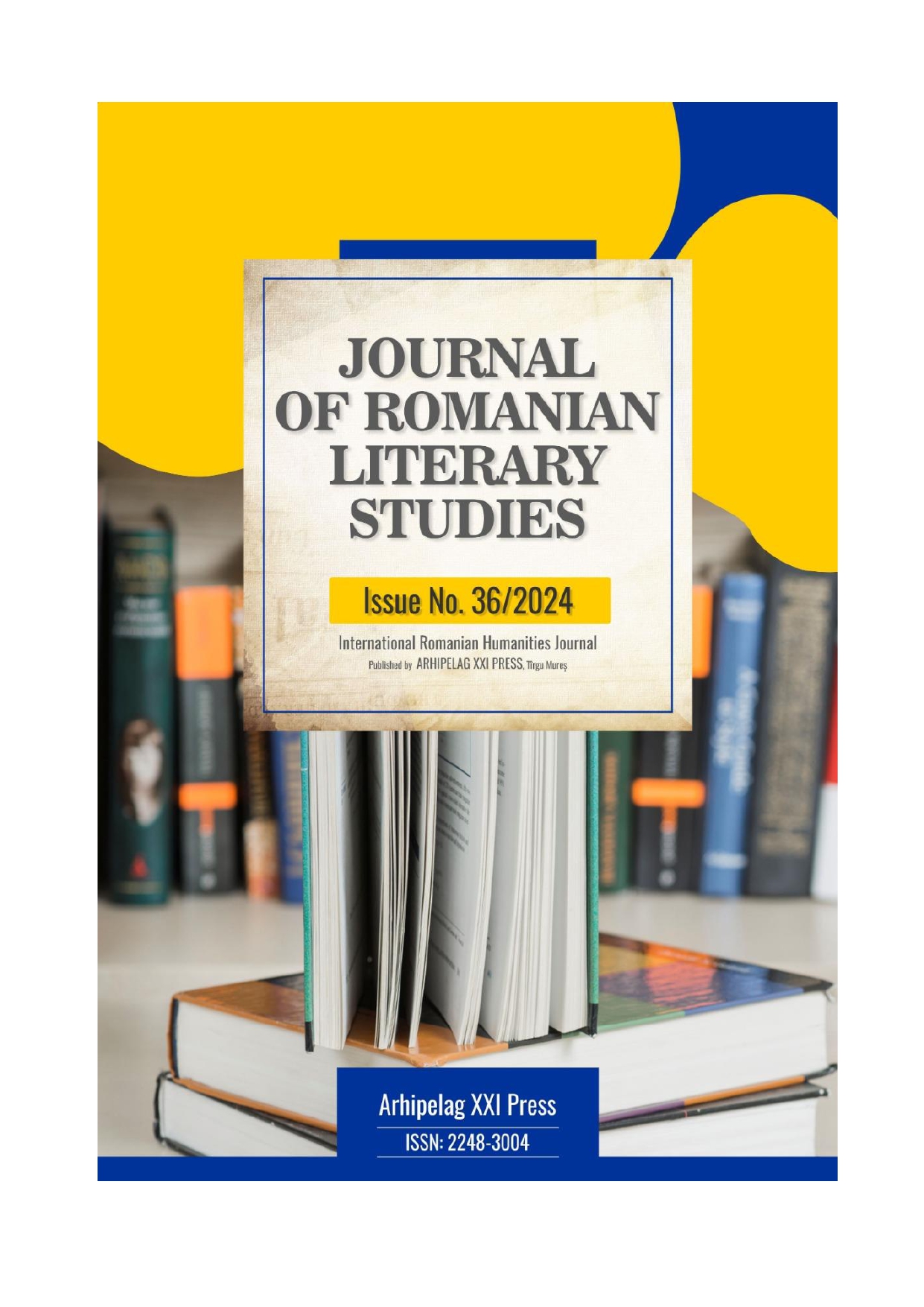
Environmental criminal law has gone through a spectacular evolution in Europe in the past 30 years. One change concerns simply the place of environmental criminal law. In many countries, provisions have now been incorporated either in a penal code or in a specific environmental statute. Moreover, in many legal systems the environment has received a more autonomous protection in the criminal law system. And finally, one can notice in many countries the introduction of a so- called toolbox approach, implying that a variety of remedies have been put in place, thus reserving the criminal law as an ultima ratio. Yet another important development relates to the fact that Europe also has taken action with respect to environmental criminal law with the Environmental Crime Directive of 2008. It is, however, striking that some of the aforementioned developments in Member States are not reflected in the Directive. Moreover, the enforcement of environmental law faces many more challenges which cannot be faced merely with a criminalization. There is a serious danger that this only leads to symbolic legislation whereby violations of environmental law are criminalized, without any guarantee of effective enforcement. There are therefore still important challenges to be met with respect to the system of environmental criminal law in Europe.
More...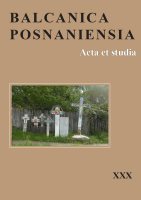
The purpose of our study is to investigate the current state of research regarding Ius Valachicum in Romanian and foreign historiography. After presenting Romanian history, palaeography and the legal history of the Carpatho-Danubian space, we turn to the Polish historiography of the North Vlachs, and to the Serbo- -Croatian historiography of the South Vlachs. Finally, we use case studies to illustrate two enacted customary laws of the Vlachs from Croatia. The methods used in this paper include description, analysis, and comparison, as well as exploratory and applied research. The article is a historiographical survey of Ius Valachicum among the Romanians and Vlachs. The medieval and premodern consuetudinary laws of the Romanians and Vlachs are reflected both in primary and secondary sources, from 14thcentury historical documents to historiographical preoccupations dedicated to Ius Vlachicum from the 18thand 19th centuries. First, we refer to the special literature explaining both ethnonyms and the historical-geographical spread of the Romanians and Vlachs. Then we present the Romanian historiography investigating the manifestations and features of Ius Valachicum in the geographical area belonging to the present-day Romanian state. Turning to the Czech and Polish historiography, the occurrence of Ius Valachicum is revealed among the North Vlachs from medieval and premodern Poland, Ruthenia, and Hungary. We also review the Serbo-Croatian historiography of the Ius Valachicum specific to the South Vlachs from Croatia and Serbia. Finally, two enacted customary laws of the Vlachs from Croatia (1436, 1630) are analysed from the point of view of legal history. These codifications of Ius Valachicum prove the juridical power and importance acquired by the Croatian Vlachs during the Middle Ages. The historiographical pros and cons, as well as the critical remarks presented at the end of this study, at the same time, offer a few methodological solutions for future investigations of Romanian and Vlach Ius Valachicum.
More...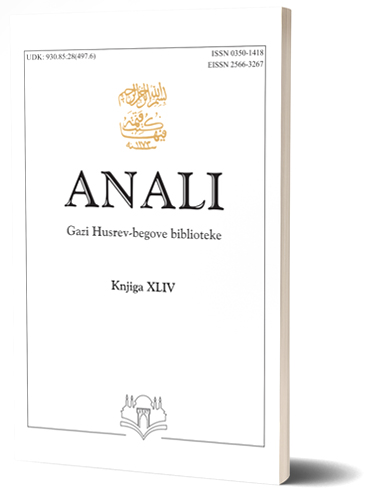
Mehmed Salih Vejihi Pasha (1798–1867) was an Ottoman statesman and one of the most important bureaucrats who held various high-ranking positions in the Ottoman state between 1828. and 1867. He performed a number of functions in the civil service in almost all the provinces of Anatolia and the Balkans, from Bosnia and Thessaloniki to Baghdad and Ankara. He participated in the implementation of the Tanzimat reforms throughout the Ottoman state. There is no doubt that he is an intriguing historical figure who was often accompanied by controversies. During his tenure as Muhafiz of Belgrade, Mehmed Salih Vejihi Pasha entered into active correspondence with the authorities of the Bosnian Eyalet, which made it much easier for him to assume the role of a wali after his appointment. After taking up his post as Wali of the Bosnian Eyalet, Mehmed Salih Vejihi Pasha announced the expected goals and benefits of the redif army, gave detailed explanations and called on all mutesellims to take over the documents of consent and the assumption of obligations. Trying to implement the provisions for the abolition of the Spahian army, he encountered the resistance of Bosnian champions who were ready to oppose the attempts to change the existing system by force of arms. A large number of revolts followed, especially in the area of Livno, Posavina and Bosanska Krajina, which the wali and his loyal detachments successfully suppressed. Then the wali abolished the institution of captains, and the frequent executions and the wali’s leadership enhanced a deep mistrust that Bosniaks had of the administration. However, the government was stronger and could influence the mood of the population, and a proclamation was issued to which the local population pledged to be faithful. Ottoman documents do not reveal that there were rebellions in the territory of Herzegovina at the time. In parallel to the aforementioned events within the Bosnian Eyalet, Ottoman documents also recorded incidents on the AustrianBosnian border as well as information that members of the raja were also involved in rebellions in the Bosnian Eyalet. Mehmed Salih Vejihi Pasha also attached importance to sacred architecture by carrying out repair work on the mosque of Bayezid Khan in Jajce, the Mewlewi tekke on Bentbaša in Sarajevo, the mosque in Bužim, and furthermore, he had a mosque built on Bentbaša, a mosque in Bijeljina and two inns next to the tekke on Oglavak near Fojnica. By the official act of Mehmed Vejihi Pasha, a new customs crossing was formed on the Bosnian-Austrian border, and it was ordered that customs contributions be deposited in the redif treasury from which calculations and payments would be made for summer military uniforms and ammunition for combat, and the costs of purchasing various ammunition produced in cannon casting workshops would be covered. Following the suppression of the Glodjo revolt, the governor condemned the leader of the revolt and the rebels and sent some of them to Istanbul. Taking into account previously received lawsuits from the Bosnian Eyalet as well as the knowledge of the latest developments, the central Ottoman authorities appointed a new wali Husrev Pasha in 1841. In March 1841, judicial process against Vejihi Pasha started. There were several reasons for filing a lawsuit on top of the criminal acts that the wali was charged with. Since all the decrees of the proclaimed tanzimat did not come to life in the Bosnian Eyalet, the wali, thanks to the documents and information he possessed, succeeded in getting the Supreme Council of Justice to exonerate him and declare him innocent. In this manner, all lawsuits that were brought from the Bosnian Eyalet, as well as the appeals of detained Bosniaks in Istanbul, were rejected to the disappointment of the population of the Bosnian Eyalet.
More...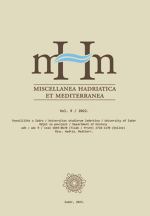
The manuscript collection known as the “Collection of the Bisantis Family” kept in the Archives of the Croatian Academy of Sciences and Arts in Zagreb contains partially damaged transcripts of several documents from the second half of the 14th century, originating from the Kotor office. The document from July 1356 refers to the division of money between the sons of Tryphon Bucchia and regulating his debts. Documents from April 14th and July 27th, 1359 speak of property disputes between Doma Berislavi and Drago Basilius, son of Mathaeus. The document of March 20th, 1362 deals with the issue of marriage and marital property. The document from January 6th, 1371, concerns the assignment of the right to the property that the Venetian Philippo Barelli acquired in Kotor.
More...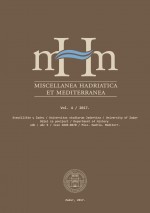
This paper presents the principal characteristics of the development of the law of the sea in the Mediterranean, from the initial historical sources to the Third UN Conference on the Law of the Sea (1982). A centuries-long process of creating that law, which applies to all seas, the authors analyzed through the prism of its application in the Mediterranean marine spaces ‒ from the time of the Roman law and its free use of the sea for all, the lordship over the sea by the feudal sovereigns (states) in the Middle Ages, until the first traces of the contemporary law of the sea in the 17th century and codification efforts in the 20th century. A special attention is paid to the complexity of the genesis of the legal regimes and boundaries in the Mediterranean Sea.
More...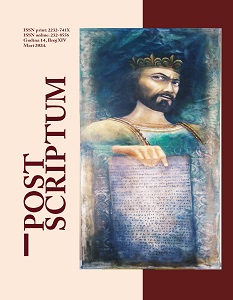
The paper deals with the development of the present tense in Bosnian legal texts of medieval Bosnia with the aim of better understanding the present tense and its continuations in the modern Bosnian language. The work is based on the corpus of charters that were created in the area of medieval Bosnia in the period from the 12th to the 15th century. We chose the corpus of charters because they are relatively far from the Church Slavonic language and are closer to the living vernacular. Present continuations are tabulated and accompanied by appropriate examples. This paper also includes a comparative analysis of the occurrence of present tenses in the Gospels. We chose this approach so that the relationship between Old Church Slavonicism and the influence of the vernacular language could be better observed. In part of this work, the method of learning and mastering the present tense is also methodologically explained through the teaching process at the faculty, because in our work with students we noticed the need for a more transparent presentation.
More...
This manuscript is a revised and supplemented work that was published in the RSU (Riga Stradins University) scientific journal Socrates (Socrates 2022, 3 (24)) under the title “Legal Doctrine of Max Weber’s Sociology of Religion” and available at https://doi. org/10.25143/socr.24.20 22.3. The basic task remains the same – to study Max Weber’s school of the sociology of law. Belatedly, this work is dedicated to the prof. Max Weber’s (hereinafter – Weber) commemoration day of the centenary and is focused on understanding the sociological structure of the state and canon (religious) law. To better evaluate Weber’s most favored views on the economic ethics of religion, by comparison, and due to the interaction of the opposites and sets of viewpoints expressed in them, in this work, the discipline of human rights will also be analysed, which will closely identify Weber’s asceticism about the spirit of normative Protestantism and the ethics of capitalism. On the other hand, in a conventional discourse and a review of the theory of social stratification, through the so-called theory of degrees and directions of rejection, the essence of Weber’s idea is best understood by examining how religion influenced the formation of an approach to contemporary law, by comparing it not only with the constitutional system of Latvia but also with other countries and their respective constitutional framework and traditions, meanwhile, considering the view that by observing the peculiarities of the era of Weber’s lifetime, the work would have a more modern character. Therefore, the purpose of the research is to establish and identify the ideas expressed by Weber regarding the value scope of social classes, layers, and typology of religion, by analysing them – conventionally, but specifically – through the doctrine of lex nature. Additionally, the purpose of the present work is to define the general structure of Weber’s philosophical thoughts and views on law, to find and identify the asceticism of the sociology of religion, interspersed with the theory of conflict and domination. However, the relevance of the research is rooted in the fact that the methods of Weber’s scientific approach are used to analyse the state’s institutional and orderly system-theoretical dependence on the bureaucratized forms of public authority, where the justification for the structured actions of the legitimate state derives from strictly defined and authorized rules of orders and ordinances. Therefore, as the socio-legal aspect of religion, the constitutional experience of countries, including Latvia, is also analysed, but only comparatively, and accordingly, in the context of social and legal norms, the bipolarity of church and religious dogmatics is studied. The current relevance, argumentation, and question of equality of the separation of the state and the church are also evaluated. In this regard – from the point of view of the social philosophy of law developed by Weber – no other research has been carried out on the national scale in Latvia, making this work unique among the analysis of other legal scholars and sociologists. Wherever this study refers to purely legal dogmatic problems, the authors have relied on the literature on the history of the church and law and, to some extent, on the past of the dogmas formed by it. Furthermore, the authors primarily refer to the documentation obtained from Weber’s law sociological argumentation and controversial perspective, which clarifies the typology of the sociology of religion. To the possible extent, the authors also delve into the primary sources of the history of law, but due to their linguistically specific style of expression and peculiarities, per the objective to study Weber’s views on the socio-historical genesis of the state and canon law and their nature, which includes evaluation of sociological understanding of the law of the canon and religious norms, textual identification of primary sources is not examined in more detail, however, the most important ideas expressed in Weber’s works are explored and compared with those of other prominent representatives of this field. Therefore, the objective of the research is to select and analyse the common and different features expressed in the works of Weber and other authors, which would most clearly characterize the doctrinal views of Weber’s sociology of religion and law postulate, or, as Weber would say himself, to mark as specifically as possible that part of the norms of the “manifesto of rights” which most typically applies to the masses of society, as opposed to the legal consciousness of the individual. Consequently, the place and role of the church and religion in the cognitive process of the state, society, and individual would be “fixed”. In addition, another objective of the article, among others, is to illustrate, using the methods of sociological research, the most significant pillars of the ideas of the history of law and the colourful nature of the brightest ideas of the world cultural heritage, and doing this by observing the most visible and vivid views in Weber’s works and analysing them in the cross-section of legal forms by using the critical thinking, which is characteristic of the present era. However, in the part of the normative analysis of the law codification, the authors focus on the analysis of the social environment of law and church law instead of their general perspective; thus, the work is mainly based on the ideas of the outstanding sociologist Weber and theses of his concepts, boldly preserving the style of the thought revealed in Weber’s main text and means of expression. For those who are familiar with the most important works of canon law, including church law, the part of the material analysis of the norms could be new precisely from the point of view of this work and the specifics of the analysis included, namely, this legal discipline is examined through Weber’s studies, works of other researchers and novelties about law, as well as the place of sociology of religion found in these works.
More...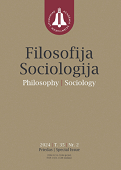
This article explores whether artificial intelligence (AI) can engage in the practice of law as an art of good and justice. It examines the historical and philosophical foundations of law as the art of promoting societal harmony and resolving moral dilemmas. The research employs critical and philosophical analysis methods integrating insights from legal scholars, ethicists, technologists, and policymakers. The study identifies AI’s potential to streamline legal processes, enhance access to justice, and reduce bias in decision-making. However, it also highlights ethical challenges such as transparency, accountability, and the impact on the legal workforce. The article emphasises the importance of striking a balance between technological innovation and human values, advocating for proactive regulation and interdisciplinary cooperation to ensure the ethical development and implementation of AI in law. The results of the study highlight the transformative potential of AI in revolutionising legal practice, emphasising its capacity to streamline processes, improve access to justice, and mitigate bias. However, ethical considerations such as transparency, accountability, and the preservation of human judgment are crucial to ensuring that AI integration in law upholds fundamental principles of justice and fairness.
More...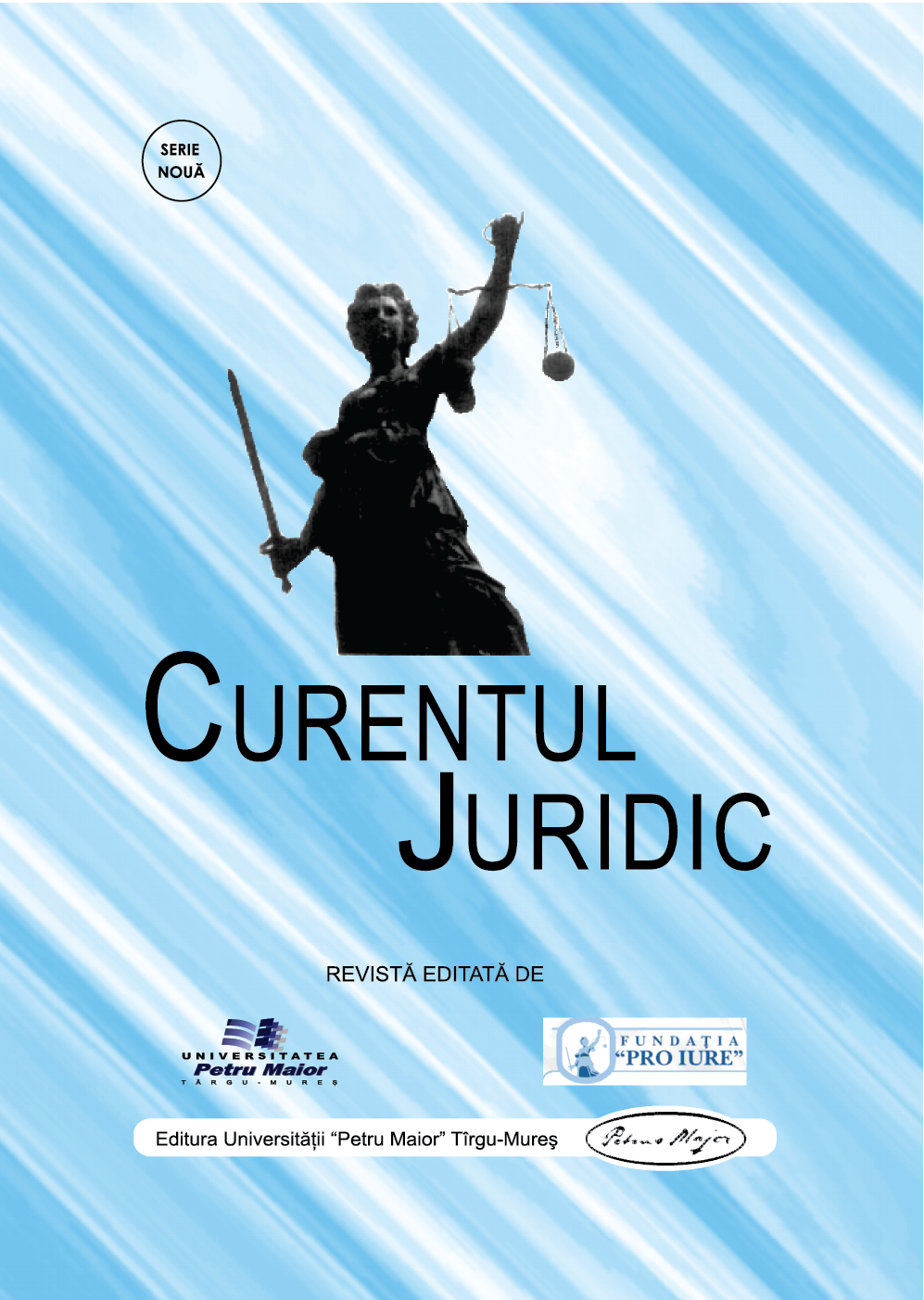
Both the Civil Procedure Code and the Criminal Procedure Code as well as their application in criminal, civil, commercial and contraventional cases, state the use of scientific evidence in finding out the truth, consisting in the judicial expertise.Unless the law expressly provides for the obligation to carry out an expertise, and we consider here the forensic expertise - meant to establish the days of medical care provided, or the cause of death, or establishing the identity of a person based on the expertise of biological traces, in various other cases the procedural legislation does not oblige the court to administer scientific evidence, leaving the choice to its discretion or, where appropriate, to the criminal investigation body.However, even if there are no provisions that expressly oblige the use of judicial expertise, we consider that both the investigation and prosecution body, the policeman or the prosecutor, as well as the courts, are obliged to order the performance of a judicial expertise when the facts deduced through the investigation or judgment cannot be clarified otherwise than on scientific basis and using the knowledge of experts in the respective domain. Beyond the classical forensic expertise of writing, namely the graphoscopic expertise, of ballistic expertise and automotive technical expertise on the dynamics of the occurrence of driving accidents - our list is not exhaustive - which are commonly carried out in both civil files, but especially in criminal cases there are situations in which we believe that it is necessary to administer scientific evidence to find out the truth. No matter how well prepared the person who finds and investigates a contravention or a crime, is, or those who are called upon to rule on civil cases, they cannot rule on technical issues, the existence of chemicals or possibly prohibited substances, as well as the overcoming of accepted decibels or the existence of products that could be considered waste - and the list could continue with other examples. However, in practice the tendency of those called to perform the act of justice is increasingly observed, to be limited to the mere findings made “with their own senses” by agents, local police or national police workers, employees of the Environmental Guard. These so-called technical findings or observations do not have the value of judicial expertise and cannot supplement such evidence by scientific quality or by objectivity, as long as they are drawn up by individuals who do not have the necessary and recognised level of scientific training, and are part of the bodies who only observe and note the facts and sanction them or send them to competent bodies for resolution. Consistent with European jurisprudence, we believe that finding out the truth involves the use of independent and objective judicial experts, highly trained specialists, or recognized and independent laboratories of expertise.
More...
The text is dedicated to the analysis of the legal regulation of military wills in the new Civil Code (Law No. 89/2012 Coll.). It places it in a historical legal context. However, priority attention is paid to a detailed analysis of the current legal regulation and potential issues that this regulation brings. It also briefly mentions other options for last dispositions that a soldier could use. The legal regulation of military wills in the Civil Code can be characterized as very well conceived, reflecting the reality of foreign missions. The fact that it takes the form of a public document is also significant if the relevant requirements are met. However, the question is how the application practice of the courts will approach the adjustment.
More...
The Bamberg Maleficent Order or Constitutio Criminalis Bambergensisis is a crucial legal text, as it was the first German criminal code to be published in printed form. It was a turning point in the development of German criminal law because it represented a synthesis of criminal law, shaped by the Northern Italian practice and theory under the influence of Roman and canon law and domestic Bavarian common law. The malefic order featured 22 woodcuts illustrating the legal text. Based on the preserved depictions, we can thus accurately imagine how criminal proceedings were conducted 500 years ago while simultaneously gaining a unique anthropological insight into the cultural history of the judiciary and judges at the beginning of the Modern Period.
More...
The contribution sheds light on a mass witch trial that began in 1661 at the court in Hrastovec. It is related to proceedings initiated a decade later and taking place simultaneously in at least five courts. Those convicted were forced to list the names of many witchcraft meeting participants, which were described with all sorts of demonic imagery. The trials were thus interconnected and kept dragging on because of the confrontations between the accused. Despite the many mass trials, the number of the indicted even exceeded those that were actually put to trial. The proceedings were caused by weather storms, and many people were only tried when a new round of trials followed a storm. The trials were affected by the people’s understanding of the causes of the disasters, conspiracy theories, and various actors such as the rural population affected by the disasters, neighbourly disputes, superstitions, belief in magic, cruel, bloodthirsty judges and their personal motives, and the Inner Austrian government in charge of the criminal justice apparatus.
More...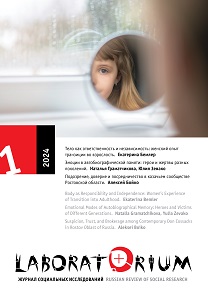
Review of: Elena Bogdanova. Complaints to the Authorities in Russia: A Trap between Tradition and Legal Modernization. London: Routledge, 2021. 240 pp. ISBN 9781138308725.
More...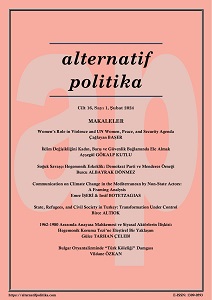
The Constitutional Court of Turkey (CCT), since its establishment in 1962, emerged as a significant actor that not only overrules the decisions of the Parliament but also takes part in most divisive political issues. Hence, there has been a growing literature explaining its role and relations with other political actors. The primary purpose of this article is twofold: (i) analyzing the relations between the Court and other political actors between 1962 and 1980 and (ii) proposing an alternative theoretical framework to explain the development and the nature of this relationship. The article challenges the dominant view explaining the CCT's role through Ran Hirschl’s Hegemonic Preservation Thesis and proposes an alternative, more nuanced explanation based on Joel Migdal’s State-in-Society approach.
More...
Some concepts discussed in the field of religion have been the subjects of more than one discipline; and these concepts have been studied from different perspectives in each discipline. Literal meaning and metaphor, which have an important place in understanding the religious rules (religious nas), are such concepts. Although literal meaning and metaphor seem to be solely linguistic concepts, they have substantially become the subjects of many religious disciplines. Jurisprudence methodology is one of the basic religious disciplines that intensively use these concepts. Although there was no definition of metaphor in the early language sources, it has been generally accepted as "the use of words other than the meaning given in the language". Imam Shafii (d. 204/820), the author of the first work of Islamic jurisprudence methodology that has survived to the present day, and Jâhız (d. 255/869), Abu Ali al-Jubbâî (d. 303/916) and Abu Hâshim al-Jubbâî (d. . 321/933) also used metaphor without defining the concept while basing their views. Two definitions about metaphor were narrated from Abu Abdullah al-Basrî (d. 369/979-80), one of the kalam methodologists, and who first made a definition of metaphor. Although the definitions made by Abu Abdullah had a significant impact on the definitions of later jurisprudence methodologists, his close methodology scholar followers did not accept these definitions. While Jessâs (d. 370/981)and Bâqillânî (d. 403/1013), made a simple definition that does not include intellectual considerations, Abū l-Ḥusayn al-Baṣrī (d. 436/1044), one of the Mu'tazila methodologists, developed a complex definition that includes theological considerations regarding metaphor. In his definition, Abū lḤusayn first pointed out that the type of address is one of the basic determining factors in order to reveal that the word is used in a metaphorical sense. In his definition, Abū l-Ḥusayn, secondly, pointed out that the metaphoric meaning of the word, as well as its literal meaning, is made within the linguistic rules. In addition, although Abū l-Ḥusayn did not express it clearly in his definition, in his evaluations within the framework of the subject, he emphasized that the presumption is one of the main determining factors in order to reveal that the word is used in a metaphorical sense. According to him, only if there is a presumption that prevents the use of the word in its literal sense, is the word taken to have a figurative meaning. In this study, which is about the metaphor definitions of Mu'tazilamethodologists, first of all, the metaphor definitions put forward by linguists and jurisprudence methodology scholars other than Mu'tazila in the first five centuries were examined. Then, the metaphoric definitions of Mu'tazila methodologists were evaluated. Among the metaphorical definitions of Mu'tazila scholars, the definition of Abu'l-Husayn al-Basrî, which takes into account the intellectual considerations of the school, was closely examined. Since the definition of Qâdî Abd al-Jabbar, one of the Mu'tazila thinkers, reflecting his understanding of metaphor has not survived to the present day, his views were also examined while examining Ebu'l-Husayn's definition. Thus, it was revealed that Ebu'l-Husayn's definition of metaphor, which contains intense theological considerations in the field of jurisprudence, is basically based on Qadi Abd al-Jabbar. Finally, in our study, the effect of the definition of metaphor conveyed by Abu'l-Husayn on the methodologists of other schools was also revealed. It was stated that this definition was accepted by Fakhr al-dîn al-Râzî (d. 606/1210), one of the methodologists in question, and Râzî's views within the framework of this definition were discussed on the intellectual basis of Mu‘tazila.
More...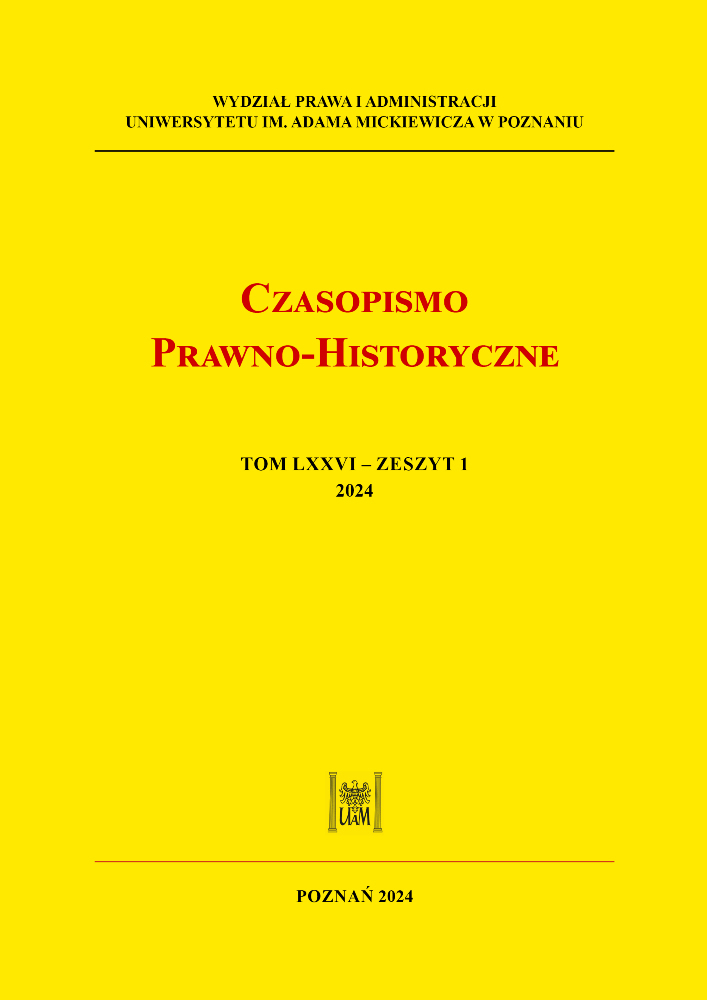
The article presents the state of affairs in Poland after 1945. As a result of the agreement of the Big Three (Roosevelt, Churchill, and Stalin) at the Yalta Conference in Crimea (February 1945), the states of Central and Eastern Europe were handed over to Stalin, who promised to hold free elections. However, even though the (non-communist) pre-war Polish law was initially still in force in order to keep up appearances, new models were brought to Poland from the Union of Soviet Socialist Republics, which were to be introduced by the communists. The courts were subjected to the ruling Communist Party. People without any legal education were appointed to the position of a judge to carry out the orders of the Communist Party. A similar process was carried out in regard to prosecutors. Investigations were carried out, torture was used, and people were tried in secret, especially in political cases. At the time, the task of the courts was to serve as a tool of repression, not of justice.
More...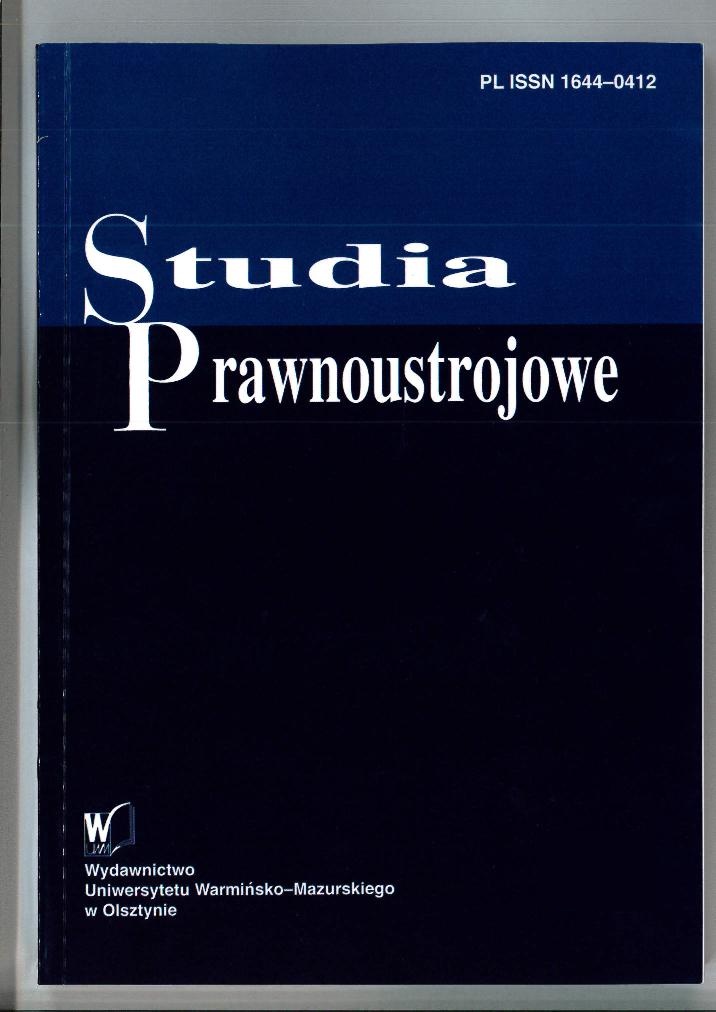
The conditions of legal performing of termination of pregnancy and criminal law regulations that penalise crimes related to abortion are controversial subjects – in legal and social terms. Starting the first Polish penal codification there were a lot of changes in the regulations, among others due to the current political situation. The subject of this paper is abortion in Polish law, id est criminal provisions and acts specifying the conditions of its legal conduct, in historical terms. This study aims to prove that the abortion law in Poland was more or less restrictive – depending on the currently applicable law. The research hypothesis assumed in this study was formulated as follows: the provisions of termination of pregnancy in the Polish legal system have changed over the years. To verify the research hypothesis, a historical research method was used. The main conclusion of this paper is that the normative content of the provisions of the Polish criminal law which penalises crimes related to abortion and of the acts which regulate conditions of its legal admissibility – has undergone many changes and still are a controversial topic.
More...
This article examines the academic work of Zygmunt Ziembiński, a prominent legal theorist who wrote during the latter half of the twentieth century. His concepts remain a significant aspect of legal doctrine. Although he passed away some time ago, his works continue to provide relevance and value for modern legal research. The primary aim of this article is to emphasise the necessity of conducting a more profound examination of Z. Ziembiński’s scientific heritage and to determine the best research methodologies for this pursuit. It is especially critical to comprehend the sociological facets of his accomplishments, which are often ignored or undervalued. By delving into the origins and underlying factors behind the adjustments in Z. Ziembiński’s implementing sociological research in jurisprudence, this investigation uncovers the uncharted facets of this academician’s work. Scrutinising Z. Ziembiński’s scholarly heritage has immense scientific potential, as it facilitates a deeper comprehension of his legal theory, while also enabling an evaluation of its applicability in the current legal and social milieu. Further research is essential to fully comprehend the noteworthy contributions of this exceptional legal theorist to the advancement of Polish legal theory and the sociology of law.
More...
The purpose of this article is to systematize the provisions regarding the rejection of succession in Polish and Slovakian law and to introduce the discussion but also to initiate the resumption of work on the harmonization of succession law in this area. Therefore this paper discusses the rejection of succession, recalling the main theses of jurisprudence and literature that are applicable for Polish and Slovakian regulations. In particular, attention was paid to the entities authorized to submit a declaration of acceptance or rejection of succession, the declaration period, the declaration submission procedure, the declaration form, the content of the declaration and finally other features, i.e. the declaration may not be submitted on condition, cannot be revoked, is non-transferable, must include the whole inheritance, etc. As a conclusion, it was noted that the idea of rejection of succession is equal, but the main difference refers to the procedure between regulations of both countries.
More...